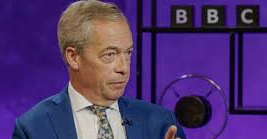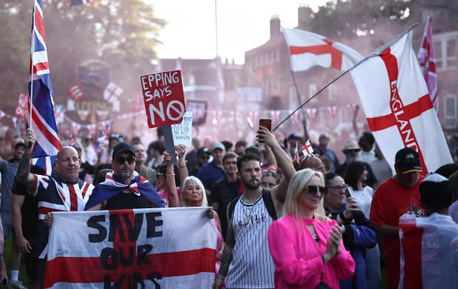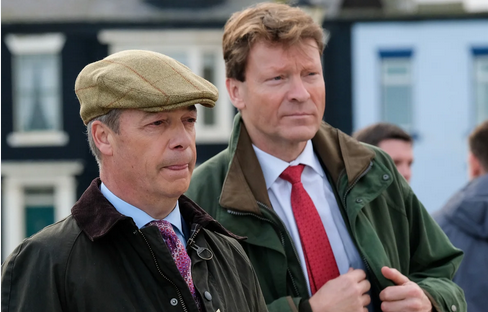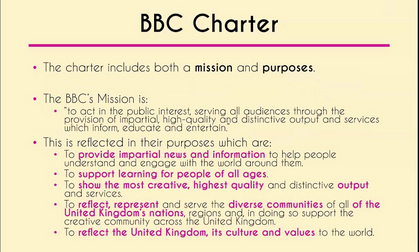The PR company for Reform UK Ltd is not supposed to be the BBC

TetleysTLDR: The summary
The BBC is over-platforming Reform UK, turning a minor, hard-right populist outfit into a media-manufactured movement. Despite holding only four MPs, Reform appears on News at Ten more often than the Liberal Democrats, and fewer than 40 percent of its claims are properly scrutinised.¹ The broadcaster’s management even discussed “winning the trust” of Reform voters, showing editorial capture rather than impartiality.² By prioritising spectacle and polls over democratic representation, the BBC legitimises a limited company masquerading as a political party while sidelining progressive voices. Its novelty-obsessed newsroom has become a megaphone for Farage’s nationalism, not a watchdog for truth. Funded by the licence-fee, the BBC is betraying its public mandate, normalising right-wing populism and weakening democracy itself. Unless it recalibrates its standards and re-learns courage, the “people’s broadcaster” will be remembered as the institution that handed the microphone to the mob.
TetleysTLDR: The long bit
The BBC has always styled itself as Britain’s sober guardian of impartiality: the broadcaster above the fray, the public service institution that informs without inflaming. Yet beneath that veneer of neutrality, something rotten is growing. The BBC, intentionally or not, is enabling fascism. It is willingly over-platforming Reform UK Ltd, transforming a limited-company political project into a manufactured movement. What we’re seeing is not journalism: it’s legitimisation. And we've been here before.
Between January and July 2025, Reform UK Ltd featured in roughly 25 percent of BBC News at Ten bulletins, compared with just 17.9 percent for the Liberal Democrats, who hold more than seventy MPs in Parliament.¹ Reform UK Ltd, by contrast, held five. The BBC’s editorial defence is that the party is 'shaping the national conversation' and must be reflected accordingly.² Yet Cardiff University’s media-content study found that fewer than 40 percent of Reform UK Ltd’s appearances were subject to meaningful scrutiny.³ That’s not balance, that’s platforming. A fringe movement with negligible parliamentary presence is now appearing almost nightly on Britain’s most-watched news programme. It’s the equivalent of giving a snake-oil salesman a permanent stall in the town square, then calling it democracy.

There is a vital distinction between reporting a party’s rise and laundering it through repetition. The BBC is no longer merely describing Reform UK Ltd, it is shaping the context that makes the party appear credible. Cardiff researchers found that over two-thirds of BBC references to Reform UK featured Nigel Farage personally, often filmed in the archetypal 'man-of-the-people' setting: pub, pint, Union Jack in the background.⁴ Each frame is a miniature campaign poster, dressed up as reportage. The result is cumulative normalisation. A publicly funded broadcaster should interrogate power, not moonlight as its publicist, giving it ad hoc Party Political Broadcasts.
Reform UK Ltd is not a centrist curiosity. It is a hard-right populist outfit, campaigning on anti-immigration rhetoric, hostility to human-rights structures, and wholesale deregulation.⁵ When a public broadcaster repeatedly presents such a party without proportional challenge, it tacitly shifts the boundaries of acceptable discourse. Media exposure begets legitimacy. Legitimacy begets votes. And once a broadcaster of the BBC’s stature confers that legitimacy, populism ceases to look fringe, it starts to look normal.
The BBC’s management defends its coverage on the basis of polling strength rather than parliamentary weight. Tim Davie told MPs that the corporation must "reflect the new political landscape.⁶ That sounds reasonable until you unpack it. Polls are not governance; they are fleeting snapshots. The BBC’s charter obliges it to reflect democratic representation, not ephemeral trends. By privileging polling over parliamentary presence, the BBC has effectively adopted the logic of the horse race, rewarding noise over substance. It treats temporary surges in public mood as equivalent to legislative power, a dereliction of the very neutrality it claims to guard.

The corporation’s lack of scrutiny is not accidental. Cardiff’s audit confirmed that only four in ten items involving Reform UK Ltd contained robust challenge.⁷ Most were little more than stenography: “Reform UK says X; the government responded Y.” Worse, internal minutes reported by Byline Times show BBC senior management discussing ways to “win the trust of Reform voters” by adapting editorial tone and story selection.⁸ Imagine that reversal of principle: the national broadcaster strategising how to placate one political demographic rather than hold it to account. That isn’t impartiality, it’s appeasement.
The BBC hides behind its most convenient myth: “We give all sides a voice.” But equal airtime is not equal accountability. A journalist who treats a doctor and an anti-vaxxer as equivalent voices is not balanced, he’s negligent. The same applies here. Impartiality is not about giving the far right its quota of sound-bites. It’s about ensuring that truth, evidence and democratic weight determine coverage. Yet the BBC’s structure rewards performative neutrality over forensic analysis. The result: passive amplification masquerading as fairness.
We’ve seen this before. In the 1930s, the British establishment flirted with fascism in a pinstripe suit, and his name was Oswald Mosley. The press gave him endless column inches, the BBC invited him to debate, and the veneer of respectability was enough to mask the poison underneath. Then, as now, the media mistook charisma for credibility and platformed a demagogue as if he were just another voice in the national conversation. History tells us exactly where that road leads: from “listening to both sides” to goose-stepping in the streets. Hate still comes wrapped in a Union Jack if not a blackshirt, and the platform isn’t a rally in Olympia, it’s a BBC studio. The lesson, apparently, still hasn’t been learned.

For progressive politics, this imbalance is existential. By making Reform UK Ltd the loudest alternative voice, the BBC crowds out the left. It frames national debate around Reform’s obsessions: immigration, sovereignty, 'woke elites' and sidelines conversations about housing, inequality, and the NHS. This is not an accident; it’s structural drift. When the public sphere is filled with right-populist narratives, the Overton Window shifts rightward. Reform’s talking points become the questions everyone must answer. Labour ends up dancing to Farage’s tune; progressive causes are pushed offstage.
Inside the newsroom, editors are chasing what they call 'cut-through': stories that grab headlines, not necessarily those that matter. A party that promises disruption is catnip to a broadcaster craving narrative drama. Reform UK Ltd knows this and performs accordingly: provocative statements, social-media clips, made-for-TV outrage. In chasing novelty, the BBC confuses attention with importance. It becomes a megaphone for spectacle, rather than a curator of relevance. And once spectacle is the coin of the realm, the demagogue always wins.
Public broadcasting exists to level the democratic playing field. Yet the BBC’s disproportionate exposure of Reform UK tilts that field sharply to the right. Every unchallenged quote, every cosy studio appearance, every 'man in the pub' segment inches the Overton Window further toward reactionary populism. By presenting Reform UK as a legitimate governing alternative before it has earned that legitimacy, the BBC weakens the distinction between protest and power. It allows a private limited company to borrow the gravitas of the public broadcaster, effectively laundering extremism through the licence-fee.

Let’s be clear: we are paying for this. The BBC’s funding comes from the licence-fee, a tax on the very public now subjected to unbalanced coverage. When that money bankrolls disproportionate exposure for a party whose policies would dismantle the rights and protections of many viewers, it ceases to be public service broadcasting. It becomes complicity. The Liberal Democrats have already launched a petition calling to 'Balance the BBC' arguing that the corporation’s coverage of Reform UK Ltd is wall-to-wall.⁹ Their frustration is justified. The BBC’s behaviour is not just editorially reckless; it’s democratically corrosive.
What the BBC needs should do
If the BBC actually believed in its founding principles, it would:
- Re-calibrate prominence thresholds airtime proportional to parliamentary presence and policy coherence.
- Match scrutiny to exposure every appearance must face rigorous fact-checking and follow-up.
- Diversify representation ensure smaller progressive parties, unions, and civic movements are given similar weight.
- Resist novelty bias treat poll spikes as transient phenomena, not mandates for airtime.
- Provide context frame Reform UK Ltd within its ideological lineage of Thatcherite neoliberalism and Farage-era nativism.
These aren’t radical demands. They’re the bare minimum for a broadcaster claiming public trust.
So let’s dispense with euphemism, the BBC has become a cowardly echo chamber for snake-oil nationalism. It has mistaken Farage’s pub-bluster for political authenticity, mistaking entertainment for public service. Instead of defending the civic space against demagoguery, it has opened the door and offered him a cup of tea. This is not some bureaucratic slip-up. It is the symptom of an institution more frightened of right-wing newspapers and angry callers to Any Questions than of betraying its public purpose. The BBC bends over backwards to appease the very forces that would gut it, because those forces shout the loudest. A true public service broadcaster would expose Reform UK Ltd as the hollow shell it is, a limited company peddling reactionary nostalgia, funded by hedge-fund libertarians, with policies built on resentment and spreadsheet populism. Instead, the BBC’s executives hide behind 'balance' as though neutrality were a virtue rather than a vacuum.

Every time the BBC invites Farage to hold court, it chips away at the firewall between journalism and propaganda. Each unchallenged sound-bite becomes another brick in the edifice of normalisation. When history looks back on this period of British broadcasting, it will see not impartiality but capitulation - the moment the national broadcaster traded integrity for ratings. The BBC once prided itself on speaking truth to power. Now it murmurs flattery to populism. And the bill for that failure will be paid in democratic currency: trust, truth, and a public too bewildered to tell the difference between journalism and manipulation.
The BBC’s over-platforming of Reform UK Ltd is not merely an editorial mistake, it is a betrayal of mandate. A broadcaster funded by the people should not be manufacturing legitimacy for those who despise public institutions. The BBC must decide whether it stands for democratic accountability or for the loudest demagogue in the room. If it continues down this path, history will record that the so-called 'people’s broadcaster' helped mainstream a grift dressed as a movement, the Farage fantasy, sold wholesale to a nation that deserved better. And the executives who let it happen will go down not as guardians of truth, but as the public-school cowards who handed the microphone to the mob.
Footnotes
- The Guardian, “BBC under fresh pressure over extent of Reform UK coverage,” 12 Sept 2025.
- Tim Davie testimony to House of Commons Media Committee, The Guardian, 9 Sept 2025.
- Cardiff University Media Analysis Unit, “Television News Monitoring Study,” 2025.
- Ibid.
- Reform UK Manifesto and summary, Wikipedia (2025).
- The Guardian, “BBC not ‘trying to ingratiate itself’ to Reform UK, says Davie,” 9 Sept 2025.
- Cardiff University, op. cit.
- Byline Times, “BBC News bosses sought to ‘win trust’ of Reform voters,” 9 June 2025.
- Liberal Democrats, “Balance the BBC” petition, 2025.
Tetley is a left of centre writer and retired musician based in the UK. A former member of the Labour Party, he writes political analysis exposing Britain’s authoritarian drift, the criminalisation of protest, and the erosion of civil liberties.
A bit of shameless self-plugging here. This is www.TetleysTLDR.com blog. It's not monetised. Please feel free to go and look at the previous blogs on the website and if you like them, please feel free to share them.

